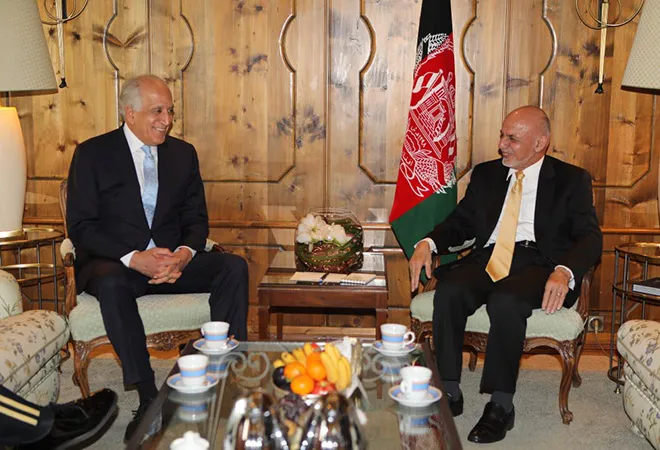-
CENTRES
Progammes & Centres
Location

Six months into the peace negotiations, the Taliban have still not agreed to talk to the Afghan government or stop their murderous spree and declare a ceasefire.
The Trump Administration is concerned and some are talking of “contingency plans” to protect US national security interests if the peace talks don’t yield optimal results. The White House is pushing back hard against the idea that Washington is selling Kabul out to the Taliban.
President Donald Trump hopes for success in the talks but “he would also not accept a bad deal,” according to a senior administration official. This was as much a signal to Kabul and the world as to their own man – Special Representative Zalmay Khalilzad.
The ground under Khalilzad appears to be shifting. The White House is striking a different note and going into damage control mode. “It’s urgent that we convince the Taliban to sit down with the Afghan government and other Afghans and engage in a political process.”
“The US will not sacrifice key gains of the last 18 years, including on human rights and particularly women’s rights,” the administration official said.
The optics of Khalilzad sitting with the Taliban for days on end while the Afghan government – a partner of the United States -- remains shut out, are awful. And many in the administration get that.
The US envoy’s latest gambit is to invite the Russian envoy for Afghanistan, Zamir Kabulov, to Washington to create an understanding with a country identified in major Trump Administration policy documents as a hostile power to say nothing of the investigations into allegations that Trump colluded with Moscow to win his election.
With both the United States and Russia competing for Taliban’s and thereby Pakistan’s assistance and Saudi Arabia along with UAE trying to coopt the Qatar talks to sideline Qatar and Iran, deal-making would be extremely tough. Would Kabulov agree to merge the Moscow process with Khalilzad’s?
The fact that Khalilzad may have given too much ground too quickly to the Taliban, allowing them to dictate the terms of negotiations has made the Trump Administration nervous. Reputational costs for the United States are high and can show up in other places.
Pakistan, of course, is playing the double game it always does. In January, it used straightforward blackmail to force Khalilzad to drop the Abu Dhabi track where he had invited the Afghan government to for a possible meeting with the Taliban. The Pakistanis didn’t like that one bit.
They accused the US envoy of sowing dissension among the players – meaning trying to lure Taliban away from ISI’s firm control. It’s a well-established fact that Pakistan’s military-intelligence complex doesn’t trust Khalilzad and will do everything to undermine him if he moves out of step with them. In the end if he ends up pushing Pakistan’s agenda because he has no other choice, it would certainly result in a “bad deal.”
The public venting last week by Afghan National Security Adviser Hamdullah Mohib against Khalilzad’s motives and methods seems to have clarified the Trump Administration’s mind as it were.
For the first time since the Qatar talks began, the White House questioned the Taliban’s commitment to a “genuine peace process” because of its refusal to sit face-to-face with an elected government of Afghanistan. If a group commits to a political process, by definition it means “reduction of violence,” which hasn’t happened.
Taliban attacks have increased in frequency and viciousness and Afghan security forces are paying a heavy price. As Mohib said, Afghan forces need to know clearly they are not being sacrificed in meeting rooms in Qatar. The Taliban talk peace by day and kill by night, a fact that even the most hard-nosed have a tough time digesting.
Mohib’s public expression of rage against Khalilzad was undiplomatic but it was also a measure of how the trust between Kabul and Washington has broken down. Imagine being part of a government the reigning superpower helped install, protect and maintain now hung out to dry with not even as much as a nod.
Mohib flouted the diplomatic rulebook and spoke on the record to US media about his state of mind but when your very existence is at stake, you might be allowed some infractions.
When he alluded to Khalilzad’s personal ambitions in Afghanistan to be a “viceroy” of a caretaker government, he wasn’t saying anything new – US media has written extensively about Khalilzad’s past machinations to be an unelected prime minister of Afghanistan working through operatives he himself installed.
Diplomatic bloodletting over Mohib’s conduct obviously went too far – the State Department virtually declared him a persona non grata for insulting Khalilzad -- and the White House is trying to repair the breach with Kabul.
In a rare admission, the US agrees that communications with the Afghan government have to improve, meaning Khalilzad should find time to visit Kabul and brief President Ashraf Ghani. Afghanistan’s ambassador in Washington D.C., Roya Rahmani, was invited for a meeting at the White House after the Mohib fiasco in a peace gesture.
Moreover, the White House agrees that the public spat was a reflection of Afghan government’s frustration that they are not in the peace talks. “Any settlement simply won’t be sustainable unless the Taliban agree to sit down with the Afghan government and work out a political settlement,” was the message. It seemed aimed at Khalilzad.
The Trump Administration promises to “keep assessing” the South Asia strategy and adjusting it as needed. The mantra remains that nothing is agreed until everything is agreed. The peace process is “not the only route” the US has to protect its national security interests. There is a hint of military options getting back to the front burner.
The views expressed above belong to the author(s). ORF research and analyses now available on Telegram! Click here to access our curated content — blogs, longforms and interviews.

Seema Sirohi is a columnist based in Washington DC. She writes on US foreign policy in relation to South Asia. Seema has worked with several ...
Read More +